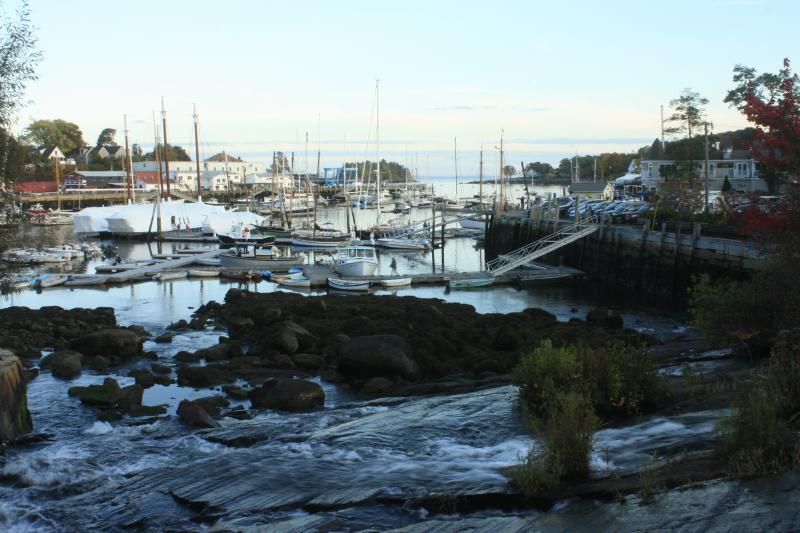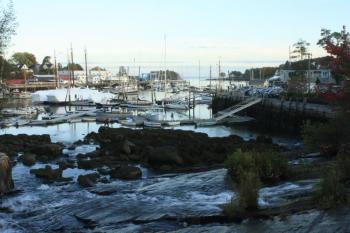Montgomery Dam hurting Megunticook ecosystems; time to let it go
This past summer, proposals for the Montgomery Dam in Camden sparked controversy among local residents and town officials. The 200-year-old dam, located in the heart of downtown, has been a popular spot for visitors and is considered a significant Camden landmark.
To many, it creates a beautiful, scenic view as the water rushes from the Megunticook River into the ocean. But in reality, it’s a man-made, concrete wall that is posing serious issues for the Megunticook ecosystem and the future resiliency of Camden in the face of climate change.
It’s time to let it go.
The dam was used during the Industrial Era to divert water to the Camden Grist Mill. Today it no longer serves the same useful purpose. It’s only harming the natural environment that Mainers care so much about.
The presence of the Montgomery Dam functions as a border wall for migratory fish, traps sediment that causes buildup of mud mounds, affects water quality, and poses severe flood risks.
Evidence suggests that before the dam was created, the rocky river supported an abundance of sea-run fish that spawned upstream and provided nutrients for countless species.
The Montgomery Dam installation and impoundment has brought about a marked decline in the abundance of certain fish, namely alewives, Atlantic salmon, brook trout, and rainbow smelt. The dam heats the water and traps sediment, subsequently transforming the river and breaking natural cycles when layers of mud buildup on the bottom.
The fish have no place to spawn and no way of leaving the river if they spill over the dam.
If Maine seeks to restore its depleting fish populations, keeping the dam would do the exact opposite.
According to the Maine Department of Marine Resources, removal of the Montgomery dam would cause a plethora of the sea-run fish to return to the Megunticook Watershed. Keeping the dam would be a surefire way of further crippling the ecosystem, an essential part of Maine’s culture and economy.
Another issue is flooding.
The surrounding buildings are at a severe risk of damage as the climate continues to change and the intensity of storms increases, and the dam requires frequent management by officials during rainstorms.
Camden Town Manager Audra Caler-Bell makes the point, in a Bangor Daily News article, that, “Being where the mountains meet the sea, there is very little opportunity when there is a very extreme rain event for water to efficiently absorb into the watershed or to make it to the ocean.”
Because natural waterways are more flood-resistant, removal of the dam would have greater flood management benefits and make the area more resilient, especially in the future.
Beyond these environmental damages, the cost alone of maintaining the Montgomery Dam are substantial. The degraded dam requires significant capital investments by the town for periodic inspections and maintenance. According to the Feasibility and Alternatives Analysis Report prepared by Interfluve, dam removal alternatives were predicted to have the lowest life-span costs compared to partial or full spillway reconstruction. Costs for removal are more likely to draw funding from external sources, such as ecological recovery and infrastructure resiliency initiatives. It’s undoubtedly more cost-beneficial to remove the dam sooner rather than later.
Dam removal raises community concerns about the negative effects that it may have on local ambience and area tourist attractions.
I now live in Camden and visited for years prior to becoming a resident. I don’t recall the muddy water underneath the buildings, or the waterfall caused by the dam. But I do remember watching the glittering sailboats taking people out on the water, walking by the lively shops on Main Street and interacting with the owners, seeing the glow of the library as it overlooks the harbor at night, and the feeling that you’re home.
Camden is not the Montgomery Dam, and the town will still be historic and beautiful without it. To ensure the future resiliency of the ecosystems and Camden itself, we must relinquish this piece of history to make way for a more resilient present and future.
Lauren Caffe, of Camden, is an undergraduate student at Bowdoin College studying government and environmental studies
Event Date
Address
United States





























